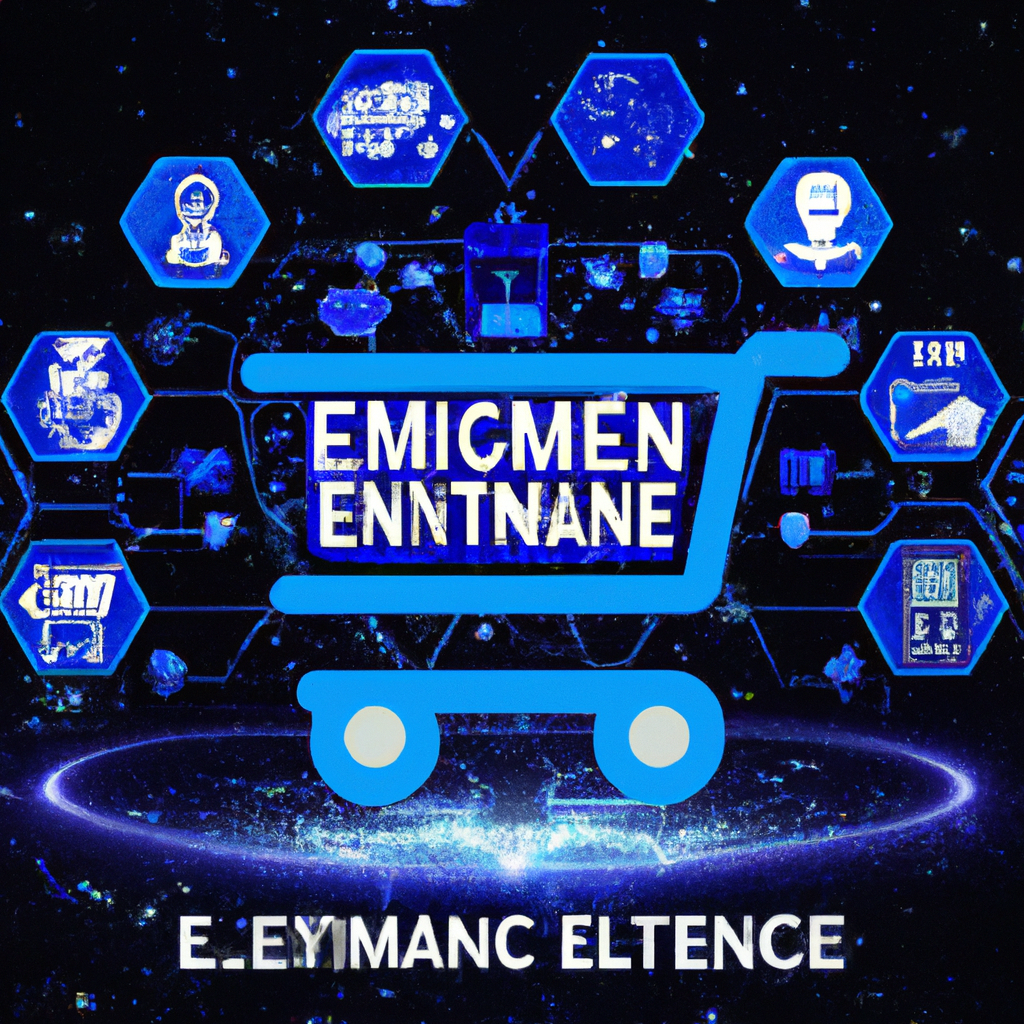-
Table of Contents
- Introduction
- How AI is Transforming E-Commerce: Benefits and Challenges
- Leveraging AI to Personalize the E-Commerce Shopping Experience
- AI-Powered Chatbots: Enhancing Customer Service in E-Commerce
- AI-Driven Recommendation Engines: Increasing Customer Engagement in E-Commerce
- AI-Powered Automation: Streamlining E-Commerce Operations
- Conclusion
with AI-Powered E-Commerce.
Introduction
The emergence of Artificial Intelligence (AI) and its application in e-commerce has revolutionized the way businesses interact with customers. AI has enabled businesses to provide a more personalized and engaging customer experience, while also increasing efficiency and reducing costs. AI-driven e-commerce solutions can help businesses better understand customer needs, preferences, and behaviors, allowing them to tailor their offerings and services to meet customer expectations. AI can also be used to automate customer service tasks, such as responding to customer inquiries, providing product recommendations, and managing customer data. By leveraging AI, businesses can create a more engaging and personalized customer experience, while also improving operational efficiency and reducing costs.
How AI is Transforming E-Commerce: Benefits and Challenges
AI is transforming the e-commerce industry in a big way. From personalizing customer experiences to automating mundane tasks, AI is making it easier for businesses to provide better services and products to their customers. Here are some of the benefits and challenges of AI in e-commerce.
Benefits
1. Personalization: AI can help businesses personalize their customer experiences by analyzing customer data and providing tailored recommendations. This can help businesses increase customer engagement and loyalty.
2. Automation: AI can automate mundane tasks such as order processing, inventory management, and customer service. This can help businesses save time and money, and focus on more important tasks.
3. Improved Security: AI can help businesses detect fraud and protect customer data. This can help businesses ensure that their customers’ data is secure and protected.
Challenges
1. Cost: AI can be expensive to implement and maintain. Businesses need to invest in the right technology and resources to make sure that their AI systems are up to date and secure.
2. Privacy: AI can collect and store large amounts of customer data. Businesses need to ensure that they are compliant with data privacy laws and regulations.
3. Accuracy: AI systems can make mistakes, which can lead to inaccurate results. Businesses need to make sure that their AI systems are accurate and reliable.
Overall, AI is transforming the e-commerce industry in a big way. It can help businesses personalize customer experiences, automate mundane tasks, and improve security. However, businesses need to be aware of the potential costs, privacy issues, and accuracy issues associated with AI. With the right strategies and resources, businesses can leverage AI to improve their e-commerce operations and provide better services and products to their customers.
Leveraging AI to Personalize the E-Commerce Shopping Experience
Welcome to the world of personalized e-commerce shopping! With the help of artificial intelligence (AI), you can now enjoy a shopping experience tailored to your individual needs and preferences.
AI-powered personalization technology is revolutionizing the way we shop online. By leveraging AI, e-commerce stores can now provide customers with a more personalized shopping experience. AI-driven personalization technology can analyze customer data to identify individual preferences and tailor product recommendations, content, and promotions to each customer’s unique needs.
For example, AI-driven personalization technology can analyze customer data to identify which products a customer is most likely to purchase. This data can then be used to create personalized product recommendations for each customer. AI-driven personalization technology can also be used to create personalized content and promotions tailored to each customer’s individual interests.
AI-driven personalization technology can also be used to create a more seamless shopping experience. AI-powered technology can be used to automate tasks such as product recommendations, content curation, and customer segmentation. This can help reduce the amount of time and effort required to create a personalized shopping experience for each customer.
By leveraging AI-driven personalization technology, e-commerce stores can provide customers with a more personalized shopping experience. This can help increase customer satisfaction and loyalty, as well as boost sales and revenue.
So, if you’re looking to take your e-commerce store to the next level, consider leveraging AI-driven personalization technology to create a more personalized shopping experience for your customers.
AI-Powered Chatbots: Enhancing Customer Service in E-Commerce
AI-powered chatbots are revolutionizing customer service in e-commerce. By leveraging the power of artificial intelligence, chatbots are able to provide customers with personalized, efficient, and accurate service.
Chatbots are computer programs that use natural language processing (NLP) to interact with customers. They are able to understand customer queries and respond with relevant information. This makes them ideal for customer service in e-commerce, as they can quickly and accurately answer customer questions and provide helpful advice.
Chatbots can also be used to automate mundane tasks, such as order tracking and product recommendations. This frees up customer service agents to focus on more complex customer inquiries.
Chatbots can also be used to collect customer feedback and analyze customer behavior. This data can be used to improve customer service and create more personalized experiences.
Overall, AI-powered chatbots are a great way to enhance customer service in e-commerce. They can provide customers with quick and accurate answers to their questions, automate mundane tasks, and collect valuable customer data. With the help of AI-powered chatbots, e-commerce businesses can provide customers with a better overall experience.
AI-Driven Recommendation Engines: Increasing Customer Engagement in E-Commerce
Are you looking for ways to increase customer engagement in your e-commerce business? AI-driven recommendation engines are a great way to do just that!
Recommendation engines are computer algorithms that use data about customers’ past purchases and browsing behavior to suggest products they may be interested in. By leveraging AI technology, these engines can provide more accurate and personalized recommendations than ever before.
For example, AI-driven recommendation engines can analyze customer data to identify patterns in their behavior. This allows them to make more accurate predictions about what products customers may be interested in. AI-driven recommendation engines can also take into account factors such as customer location, age, gender, and more to provide even more personalized recommendations.
Using AI-driven recommendation engines can help you increase customer engagement in your e-commerce business. By providing customers with personalized product recommendations, you can encourage them to explore your store and discover new products they may be interested in. This can help you increase sales and build customer loyalty.
AI-driven recommendation engines can also help you better understand your customers. By analyzing customer data, you can gain valuable insights into their preferences and buying habits. This can help you create more targeted marketing campaigns and improve the overall customer experience.
Overall, AI-driven recommendation engines are a great way to increase customer engagement in your e-commerce business. By providing customers with personalized product recommendations, you can encourage them to explore your store and discover new products they may be interested in. This can help you increase sales and build customer loyalty.
AI-Powered Automation: Streamlining E-Commerce Operations
E-commerce operations can be complex and time-consuming, but AI-powered automation can help streamline the process. Automation can help reduce manual labor, improve accuracy, and increase efficiency.
AI-powered automation can help automate mundane tasks such as data entry, order processing, and inventory management. Automation can also help with more complex tasks such as customer segmentation, product recommendations, and fraud detection. Automation can help reduce the time and effort required to complete these tasks, allowing businesses to focus on more important tasks.
AI-powered automation can also help improve accuracy. Automation can help reduce errors by eliminating manual data entry and ensuring that data is entered correctly. Automation can also help detect and prevent fraud by analyzing customer data and flagging suspicious activity.
AI-powered automation can also help increase efficiency. Automation can help reduce the time it takes to complete tasks, allowing businesses to focus on more important tasks. Automation can also help reduce costs by eliminating manual labor and reducing the need for additional staff.
Overall, AI-powered automation can help streamline e-commerce operations. Automation can help reduce manual labor, improve accuracy, and increase efficiency. Automation can help businesses save time and money, allowing them to focus on more important tasks.
Conclusion
In conclusion, AI and E-Commerce have the potential to revolutionize the customer experience and engagement. AI can be used to personalize the customer experience, automate customer service, and provide more accurate product recommendations. AI can also be used to analyze customer data and provide insights into customer behavior. By leveraging AI, e-commerce businesses can create a more engaging and personalized customer experience, leading to increased customer loyalty and satisfaction.




